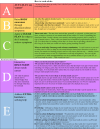Talking about cancer: Patient responses to raising awareness of oral cancer in primary dental care
- PMID: 35964230
- PMCID: PMC10946823
- DOI: 10.1111/cdoe.12783
Talking about cancer: Patient responses to raising awareness of oral cancer in primary dental care
Abstract
Objectives: Dentists and other members of the dental team could raise awareness by talking about oral cancer during routine dental check-ups. A communication guide has been developed to facilitate this. However, it has been suggested that discussions about oral cancer may raise patients' anxiety and this has been documented by dentists as a barrier to having these conversations. The current research aimed to investigate implementation of the communication guide and its impact on the dental patient.
Methods: A consecutive-case sample of adult dental patients attending primary dental care for a routine NHS check-up at one dental practice were invited to take part in the study via letter prior to their appointment. Consultations of participating patients (n = 77) were audio-recorded. Before and after their appointment, patients were asked to rate their current anxiety via the six-item version of Spielberger's State-Trait Anxiety Inventory. Audio recordings of each consultation were reviewed by two raters to determine the extent to which the dentist covered the topics recommended in the communication guide.
Results: The dentist informed all patients that they were being checked for oral cancer, spoke about signs and symptoms, and discussed risk factors. However, they rarely recommended where help should be sought or addressed barriers to seeking help. Discussions took an average of 95 s. The extent to which oral cancer was discussed did not correlate with patients' post-appointment anxiety. Patients made positive or neutral responses to the discussions. The few questions that were asked were easily addressed.
Conclusions: As findings are based on one dentist working at one practice, generalization of these results should be cautious. The study indicated that using an evidence-based guide to talk about oral cancer did not appear to raise patients' anxiety in this practice population. This could help to increase awareness of oral cancer in the endeavour to facilitate early cancer diagnosis.
Keywords: communication; early diagnosis; fidelity; observation; oral cancer.
© 2022 The Authors. Community Dentistry and Oral Epidemiology published by John Wiley & Sons Ltd.
Conflict of interest statement
None.
Figures
References
-
- Bosetti C, Carioli G, Santucci C, et al. Global trends in oral and pharyngeal cancer incidence and mortality. Int J Cancer. 2020;147(4):1040‐1049. - PubMed
-
- Lewis MAO. Mouth cancer: presentation, detection and referral in primary dental care. Br Dent J. 2018;225(9):833‐840. - PubMed
-
- Bachmann AS, Zaunbauer AC, Tolke AM, et al. Well‐being and quality of life among oral cancer patients ‐ psychological vulnerability and coping responses upon entering initial treatment. J Craniomaxillofac Surg. 2018;46(9):1637‐1644. - PubMed
-
- Public Health England . Oral Cancer in England. A report on incidence, survival and mortality rates of oral cancer in England, 2016 to 2016. 2020. Available at https://assets.publishing.service.gov.uk/government/uploads/system/uploa... [Accessed December 2021].
-
- Scott SE, Grunfeld EA, Main J, McGurk M. Patient delay in oral cancer: a qualitative study of patients' experiences. Psycho Oncol. 2006;15(6):474‐485. - PubMed
Publication types
MeSH terms
Grants and funding
LinkOut - more resources
Full Text Sources
Medical
Research Materials


